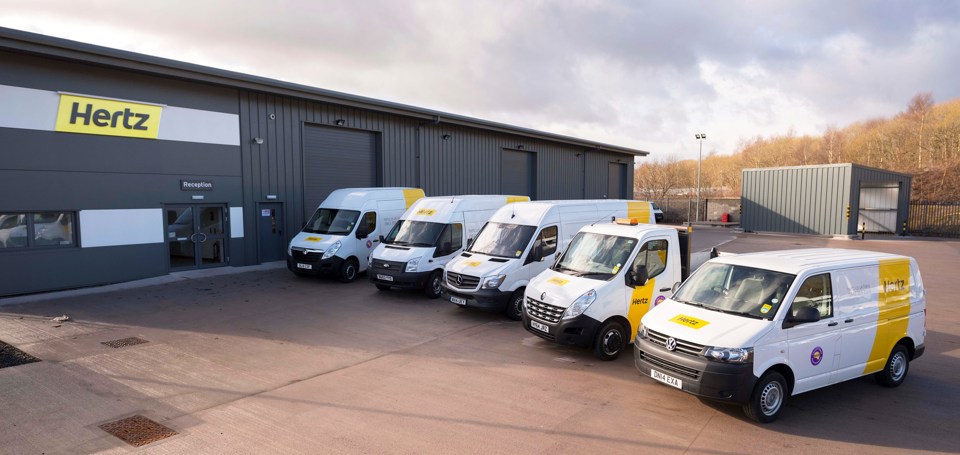Hertz has come a long way since a 22-year-old Walter Jacobs opened a car rental operation in Chicago in September, 1918.
Starting with a dozen Model T Fords, which he repaired and repainted, Jacobs expanded his operation to the point where, within five years, the business generated annual revenues of about $1 million.
Five years later, he sold the business to John Hertz, president of Yellow Cab and the Yellow Truck and Coach Manufacturing Company.
Today, it operates the Hertz, Dollar, Thrifty and Firefly car rental brands in more than 11,000 locations throughout 140 countries in North America, Europe, Latin America, Asia, Australia, Africa, the Middle East and New Zealand.
Its success has been built around a willingness to innovate and an ability to identify and exploit opportunities within the marketplace.
It is no surprise then that Hertz is tapping into a growing corporate demand for flexible fleet hire as the economy continues to recover post-recession.
Earlier this year, it announced it was expanding its van rental network in the UK thanks to two new ‘van supersites’ in Glasgow and West Thurrock.
The new locations take the total number of Hertz van supersites in the UK to 20, boosting Hertz’s van rental capacity, creating dozens of new jobs and enabling further development within the division, which last year saw its fleet grow by 26%.
Factfile
Company: Hertz UK
General manager, Hertz UK and Europe: Neil Cunningham
Time in role: 17 years
Key products: Flexible van hire and Hertz 24/7
Rental locations: 155
Fleet growth in 2014: 26%
Neil Cunningham , general manager, Hertz UK and Europe, explains: “We have had a clear vision for our van business in the UK, but demand has increased so much, particularly in Scotland and east London, that we were outgrowing our existing locations.”
The Glasgow and West Thurrock locations are strategically positioned close to key motorways to serve the west coast of Scotland, and London and the south east of England, respectively.
Both occupy sites of around 1.5 acres, incorporating warehouses, workshops, and office space. West Thurrock – just off the M25, to the east of the capital – has a total capacity of 1,300 vans, while the supersite in Glasgow, which cost in excess of £330,000, has space for more than 1,000 vans.
Cunningham says: “Coming out of recession, people are still not really sure about their order books; they’re not getting long-term contracts, so they cannot go out and lease a vehicle and the alternative is to rent.”
Hertz provides a full maintenance service in line with the vehicle manufacturers’ recommendations and a 24/7 recovery and breakdown service to get customers back on the move quickly, either through roadside repair or vehicle replacement.
“We’re seeing an increasing number of businesses opting for commercial vehicle rental as an alternative to ownership,” says Cunningham.
“Our flexible van rental service helps customers focus on growing their businesses efficiently by removing the financial commitment of purchasing a fleet and by saving them the administrative headache of insurance, breakdown cover, maintenance, servicing and road tax.”
The range available at Hertz’s van supersites in Glasgow and West Thurrock includes small vans such as the Fiat Fiorino, Fiat Doblo and Volkswagen Caddy, as well as medium vans such as Ford Transit Custom, Vauxhall Vivaro and Volkswagen Transporter. For larger loads, customers can opt for the Ford Transit in long wheelbase or extended wheelbase variants, Mercedes-Benz Sprinter, Fiat Ducato and Vauxhall Movano vans.
Cunningham admits: “We’re still relatively small in the market, but what we’re finding is it’s very important that we segment our business.
“We look for a niche. For example, two years ago we didn’t have tippers on our fleet, and now we’ve opened up a market in construction and roadside works.
“Anybody who rents a van, who has peaks and troughs in demand and who has got short order books is a big target for us.”
Single and crew cab tippers are available alongside box vans such as the Ford Transit Luton, curtain siders and drop siders, as well as nine and 17-seat minibuses and double or single cab 4x4s.
There are no fixed hire periods or penalties for early returns, with the option for customers to change, increase or reduce their fleet according to their business needs.
Cunningham explains: “Our flexi-rent product is an informal commitment to keep the vehicle over a long period of time, but if disaster strikes in your business and you have to return the vehicles, you can return them without suffering any penalty.
“We’ll judge pricing on the mileage you estimate you’re going to do, and if you exceed that we won’t charge you excess mileage. We’ll have a stern conversation with you, but it gives customers the ultimate in flexibility when it comes to increasing their vehicle resources.”
Customers will also have access to a range of benefits such as dedicated onsite commercial vehicle experts and livery and wrapping services.
Additionally, Hertz 24/7 by the hour, around the clock van rental is available from both supersites, providing businesses with further flexibility and convenience.
Hertz also gives customers a chance to improve their operating standards, by helping them become accredited members of the Freight Transport Association’s (FTA) Van Excellence Scheme.
Technology provides greater control
Hertz is offering organisations operating traditional pool fleets and those with grey fleet drivers greater control through Hertz 24/7. The hourly rental product was originally launched as ‘Connect by Hertz’ in London, Paris and New York in December, 2008, as a B-to-C (business to consumer) product, before becoming Hertz on Demand and then 24/7.
Neil Cunningham explains: “We launched it deliberately as B-to-C as we weren’t quite sure how partners would respond to it and actually use it.”
Customers reserve the car online, or by using the Hertz 24/7 app, and use a pre-provided fob to gain entry to the vehicle. An alternative key pad entry system is currently being rolled-out. However, within a year of the service being launched, B&Q, which already had an existing relationship with Hertz through its delivery fleet, started a trial in nine stores with the same technology fitted into vans.
The vans were promoted instore to customers who were buying bulky goods. Instead of getting the store to deliver the goods, they could choose to rent a van by the hour to take their items home. In what was effectively a B-to-B-to-C service, customers pay around £14 per hour and 25ppm, with fuel included.
The service has now grown to include the likes of Ikea and Homebase, with 200 vans being deployed at stores around the country. However, as the service began to gain traction, Hertz was contacted by Heathrow which saw the potential of Hertz 24/7 replacing its existing pool fleet that was used by its staff.
Cunningham explains: “It was able to replace 12 leased pool cars with nine tech-enabled cars and immediately realised savings of 25-30%, just by reducing the number of vehicles it operated.”
Other companies followed suit, including Pricewaterhouse Coopers and Sky. There are several more in the pipeline. Cars start at around £5-6 per hour and 25ppm (includes fuel), with insurance underwritten by the fleet operator.
As well as offering Hertz 24/7 direct, Cunningham says it is also working with leasing companies to provide Hertz 24/7 as a white label product to their customers. He says: “A good substitute for grey fleet is a pool fleet, but traditional pool fleets are not well controlled.”
The vehicles are low emission and employees can have both a business and leisure profile in the member database enabling out of hours use.





















Amnda - 24/07/2015 11:04
This might be the nicest car rental experience of my life. The staff was so friendly, starting with the drive who stropped the van to pick me up at the terminal after he'd already pulled away. The staff at the counter was so friendly that I was actually a little suspicious of how nice they were being! I'd booked online through auto Europe this time and had had a horrible experience in Scotland with some insurance stuff a year ago so I was terrified of how I might be screwed over this time. Craig took care of my reservation and was just as nice as he could be. He took time to explain the "spare" tire, which was an air pump basically. Amanda G / Editor at www.atlanticchoice.com Rent a car corfu